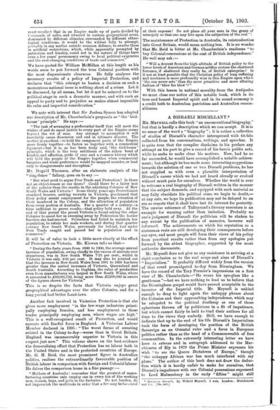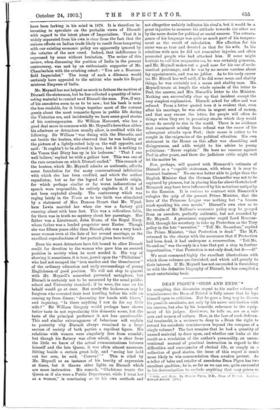A DLSRAELI MISCELLANY.*
Mn. MEYNELL calls this book "an unconventional biography," but that is hardly a description which we can accept. It is in no sense of the word a " biography " ; it is rather a collection of studies of Disraeli's character interspersed with tit-bits collected from his conversations, writings, and speeches. It is quite true that the compiler disclaims in his preface any attempt on his part to give a record of his hero's public acts, while be seeks to make clear his motives. Now, had he so far succeeded, he would have accomplished a notable achieve- ment; but although he has made some interesting suggestions towards the solution of one or two Disraeli problems, be has not supplied us with even a plausible interpretation of Disraeli's career which we had not heard already or evolved without much pain for ourselves. Whether the world is ever to welcome a real biography of Disraeli written in the manner that the subject demands, and equipped with such material as may fully elucidate his political aims, we begin to doubt,— at any rate, we hope its publication may not be delayed to an era so remote that it shall have lost its interest for posterity. The unwise reticence of Talleyrand's literary executors is an example for warning rather than imitation. Probably no one's judgment of Disraeli the politician will be shaken to any extent by the publication of memoirs, however well informed. The achievements on which his reputation as a statesman rests are still developing their consequences before our eyes, and most people will form their views of his policy from practical results rather than from any apologies put forward by the ablest biographer, supported by the most authentic documents.
Mr. Meynell does not give us any assistance in arriving at a right conclusion as to the real scope and aims of Disraeli's "Imperialism." It probably differed widely from the version of that creed promulgated to-day from Birmingham. We have the record of the Tory Premier's impressions on a first view of Mr. Chamberlain—" He wears his eye-glass like a gentleman "—but we have nothing to lead us to believe that the Birmingham gospel would have proved acceptable to the inventor of the Imperial title. Mr. Meynell is unkind enough to drag to light again the unhappy phrase about the Colonies and their approaching independence, which may be relegated to the political dustheap as one of those aphorisms thrown off by politicians in a fit of impatience, but which cannot fairly be held to bind their authors for all time to the views they embody. Still, we have enough to indicate that up to the end of his life Disraeli's Imperialism took the form of developing the position of the British Sovereign as an Oriental ruler and a force in European politics rather than as the head of a Commonwealth of free communities. In the extremely interesting letter we have here in extenso and in autograph addressed to the Mar- chioness of Ely in 1879 the Prime Minister expresses his wish "to see the Queen Dictatress of Europe," though 'the unhappy African war has much interfered with my
plans." The author of this book does not draw the deduc- tion which it is hardly unfair to make for ourselves, that Disraeli's impatience with our Colonial possessions expressed to Lord Malmesbury in the early " fifties " might still
• Benjamin Disraeli. By Wilfrid MeynelL 2 vols. London Hutchinson and Co. 1_26s. net]
have been lurking in his mind in 1879. It is therefore in- teresting to speculate on the probable views of Disraeli with regard to the latest phase of Imperialism. That it is -widely separated from his own is clear from the fact that the serious effects on Indian trade likely to result from tampering with our existing economic policy are apparently ignored by the votaries of the new creed. Indeed, that indifference is expressed by some without hesitation. The writer of this review, when discussing the position of India in the present controversy, was met by an enthusiastic supporter of Mr. Chamberlain with the crushing retort : "You are a Beacons- field Imperialist." The irony of such a dilemma would certainly have appealed to the satirist who made his Royal mistress Empress of India.
Mr. Meynell has not helped us much to fathom the motives of Disraeli the statesman, but he has collected a quantity of inter- esting material to remind us of Disraeli the man. Few, if any, of his anecdotes seem to us to be new ; but his book is none the less readable, for it brings together most of the current gossip about the most romantic figure in public life during the Victorian era, and incidentally we have some good stories of his contemporaries. Sir William Harcourt, who has a good deal more in common with Mr. Meynell's hero than either his admirers or detractors usually allow, is credited with the following. Sir William "was dining with the Disraelis, and sat beside the hostess, who observed that he was looking at the picture of a lightly-robed lady on the wall opposite, and said : It oughtn't to be allowed in here ; but it is nothing to the Venus that Dizzy has up in his bedroom." That I can well believe,' replied he with a gallant bow. This was one of the rare occasions on which Disraeli smiled." This remark of the hostess, which Mr. Meynell admits as authentic, affords some foundation for the many conversational infelicities with which she has been credited, and which the author repudiates; but as for the legend of her humble origin, for which perhaps similar or far worse indiscretions of speech were responsible, he entirely explodes it, if it had not been exploded already. The controversy which was raging lately in the Times as to her birth was stimulated by a statement of Mrs. Duncan Stuart that Mr. Wynd- ham Lewis married her when she was a factory girl running about with bare feet. This was a ridiculous fable, for there was in truth no mystery about her parentage. Her father was a Lieutenant, John Evans, of the Royal Navy, whose father was a landed proprietor near Exeter. Though she was fifteen years older than Disraeli, she was a very hand- some woman even at the date of her second marriage, as the excellent reproductions of her portrait given here testify.
Even his worst detractors have felt bound to allow Disraeli credit for devotion to the woman who gave him an assured position in society when he most needed it. His way of showing it sometimes, it is true, jarred upon the "Philistines" who had not escaped the "iron maiden and the thumbscrew" of the ordinary education and early surroundings of young Englishmen of good position. We will not stop to quarrel with Mr. Meynell's somewhat perverted metaphors, but Disraeli is certainly not to be measured by the usual public- school and University standard ; if he were, the case on his behalf would go at once. But surely the lookers-on may be forgiven who resented their host kneeling before his wife on coming up from dinner, "devouring her hands with kisses," and inquiring, "Is there anything I can do for my little wife-?" Sir William Gregory would perhaps have shown better taste in not reproducing this domestic scene, but the taste of the principal performer is not less questionable. This and similar extravagances of behaviour will explain to posterity why Disraeli always remained to a large section of society of both parties a repellent figure. His relations with women were singularly free from scandal ; but though his flattery was often adroit, as is clear from the little we know of the actual communications between himself and the late Queen, it was often almost nauseous. Sitting beside a certain great lady, and "seeing her hold out her arm, he said, ` Canova! ' " This is cited by Mr. Meynell as an instance of his brevity of expression at times, but it throws other lights on Disraeli which are more instructive. His remark, "Gladstone treats the Queen as if she were a Public Department, while I treat her as a woman," is convincing as to his own methods and not altogether unfairly indicates his rival's, but it would be a great injustice to measure his attitude towards the other sex by the mere desire for political or social success. The extrava- gance of his language was quite as much part of his tempera- ment as the result of calculation. His affection for his sister was as true and devoted as that for his wife. In his relations with men he did not remember injuries, and often promoted people who had attacked him. If some might hesitate to call him magaanimeus, he was certainly generous, and Mr. Meynell makes out a good case for his use of eccle- siastical patronage; and he was by no means careless about lay appointments, and was no jobber. As to his early career (as Mr. Birrell has well said), if he did some mean and shabby things, he was certainly not a mean and shabby man. Mr. Meynell treats at length the whole episode of the letter to Peel, the answer, and Mrs. Disraeli's letter to . the Minister. Nothing can successfully clear up that incident except the very simplest explanation. Disraeli asked for office and was refused. From a letter quoted here it is evident that, even after his marriage, he was often in urgent need of money, and that may excuse the letter, for people will often do things when they are in pecuniary straits which they would never do merely to rise in the world. There is no evidence that resentment arising from refusal was the cause of his subsequent attacks upon Peel ; their cause is rather to be sought in the exigencies of the political situation. His own statement in the House on this affair was shambling and disingenuous, and adds weight to his advice to young politicians: "Never explain." He bore no rancour against Peel in after years, and there the judicious critic might well let the matter be.
Few, perhaps, will quarrel with Bismarck's estimate of Disraeli as a "capable statesman, with whom it is easy to transact business." No one was better able to judge than the English Minister that the German Chancellor was not to be captured by phrases, but in placing him far above Gortchakoff Bismarck may have been influenced by his notorious antipathy to the Russian. It is curious to contrast with Bismarck's eulogies the quip of the present Prime Minister, that the hero of the Primrose League was nothing but "a brazen mask speaking his own novels." Disraeli's own view as to the results of Mr. Balfour's economic policy may be gauged from an anecdote, perfectly authentic, but not recorded by Mr. Meynell. A prominent supporter urged Lord Beacons- field, through his secretary, to take up Protection as the Tory policy in the late "seventies." "Tell Mr. So-and-so," replied the Prime Minister, "that Protection is dead." The M.P. returned to the charge with the assurance that if Protection had been dead, it had undergone a resurrection. "Tell Mr. So-and-so," was the reply in a tone that put a stop to further importunities, "that Protection is not only dead, but d—d!"
We must commend highly the excellent illustrations with which these volumes are furnished, and which add greatly to their interest. If Mr. Meynell has not succeeded in furnishing us with the definitive biography of Disraeli, he has compiled a most entertaining book.























































 Previous page
Previous page